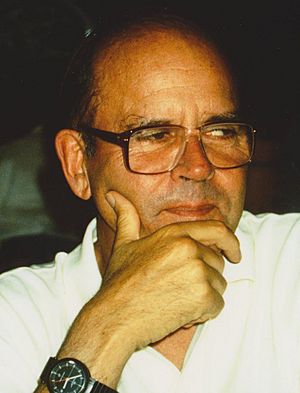Johannes de Villiers Graaff facts for kids
Quick facts for kids
Johannes de Villiers Graaff
|
|
|---|---|
 |
|
| Born | 19 February 1928 |
| Died | 6 January 2015 (aged 86) Cape Town, South Africa
|
| Nationality | South African |
| Institutions | University of Cambridge, Nedbank |
| Field | Welfare economics |
| School or tradition |
Welfare economics |
| Alma mater | St John's College, Cambridge (PhD) University of Cape Town (BA) |
| Influences | Abram Bergson |
Johannes de Villiers Graaff (also known as Jan de Van Graaff or Jannie Graaff) was an important South African economist. He was born on February 19, 1928, and passed away on January 6, 2015. He is best known for his work in Welfare economics, which is about how to make an economy fair and efficient for everyone. Graaff also studied how much people should save and helped create the idea of a social welfare function. His most famous book, Theoretical Welfare Economics, was published in 1957.
Contents
Early Life and Family
Johannes Graaff was born in Muizenberg, Cape Town, on February 19, 1928. He came from a wealthy Afrikaans family. He was the youngest of three children of Sir David Graaff, 1st Baronet. His older brother was Sir De Villiers Graaff, 2nd Baronet.
Graaff was a very bright student. When he was just fifteen, he finished high school at Diocesan College. He had the second-highest marks in all of South Africa. In 1951, he married Lillian Clare Thomson. She was the daughter of Sir George Paget Thomson. They had six children together.
His Work in Economics
Graaff first studied at the University of Cape Town. Then, he went to St John's College, Cambridge in England. He earned his PhD in economics there in 1950. After finishing his studies, he taught economics at Cambridge until 1953.
In 1957, he published his famous book, Theoretical Welfare Economics. This book was based on his PhD work. It was a very important book in the field of Welfare economics. It was reprinted six times in its first ten years because it was so popular.
Graaff decided to leave his teaching job at Cambridge. He bought a farm in the Koue Bokkeveld region of South Africa. Even though he left full-time teaching, he still gave lectures. He was a visiting lecturer at the University of Cape Town and Stellenbosch University. From 1968 to 1969, Graaff was the President of the Economic Society of South Africa. He also helped support the South African Journal of Economics.
Graaff made big contributions to how we think about the well-being of a country. He was the first to show how fairness and a country's total income are connected. He also developed ways to measure how well an economy was doing. This went beyond just making sure resources were used efficiently. He wanted to make sure the benefits were shared fairly too.
After Academia
Graaff played a big part in shaping South Africa's tax laws. He believed that taxes could help make society fairer. He thought taxes could help share wealth more evenly. In the 1970s, he was on John Vorster's economic advisory team.
In the 1980s, Graaff was a key thinker on the Margo commission. This group changed South African tax law. He helped the commission decide to collect more money through a more efficient indirect tax. This led to South Africa adopting a Value Added Tax (VAT). VAT is a tax added to goods and services.
From 1994 to 1998, Graaff was on the Katz commission. This group looked at how the tax system could help the new South African government. This led to the South African Revenue Service becoming an independent organization.
Graaff was also in charge of two companies. He was the managing director of Graaff's Trust, a wealth management company. He also led Milnerton Estates, an urban development company. This company built many suburbs along Cape Town's West Coast, like Parklands and Milnerton.
Mountaineering
Johannes Graaff was also a very skilled mountain climber. He was one of South Africa's most active mountaineers. He discovered new climbing routes in East Africa and the Himalayas. He was also one of the first people to officially climb the Spitzkoppe mountain in Namibia. He wrote many articles about mountain climbing for the South African Mountaineering Journal.
Death
Johannes de Villiers Graaff passed away on January 6, 2015. He was 86 years old. He died in Kenilworth, Cape Town, after an accidental fall on Long Street.
Major Works
- Fluctuations in Income Concentration, 1956, South African Journal of Economics.
- Rothbarth's `Virtual Pricing System' and the Slutsky Equation, 1947, Review of. Economic Studies, 15, 91–95
- A Note on the Relative Merit of Taxes and Subsidies, 1947, South African Journal of Economics.
- Towards an Austerity Theory of Value, 1948, South African Journal of Economics.
- On Optimum Tariff Structures, 1949, Review of. Economic Studies.
- Theoretical Welfare Economics, 1957, Cambridge, UK: Cambridge University Press.
- Equity and Efficiency as Components of the General Welfare, 1977, South African Journal of Economics.
 | Misty Copeland |
 | Raven Wilkinson |
 | Debra Austin |
 | Aesha Ash |

